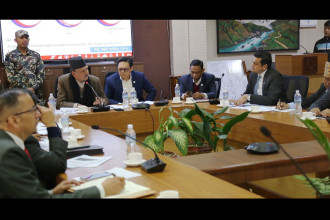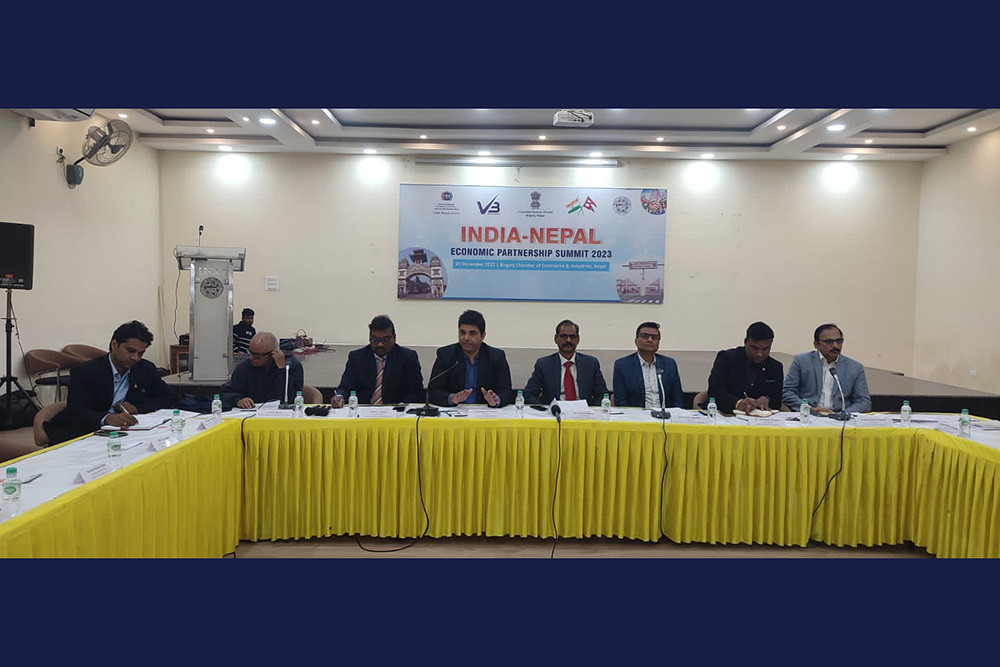.jpg)
KATHMANDU: The Governance Lab (Govlab) successfully concluded the National Governance Symposium 2023 set against the backdrop of Nepal's significant milestones, including its graduation from Least Developed Country status.
The symposium brought together key stakeholders in the nation's federal transition. Furthermore, the symposium was honoured to have the support of key governmental entities, including the Ministry of Federal Affairs and General Administration, Ministry of Finance, National Planning Commission, and the Office of the Prime Minister and Council of Ministers.
The event was organised in collaboration with Daayitwa and Nepal Leadership Academy.
The theme for the symposium was "Governance Innovations for Inclusive Development,” which featured thought-provoking sessions concentrating on political, economic, and social inclusion from distinguished dignitaries and experts who emphasized innovative prospects and interventions for inclusion and collaborative governance approaches in Nepal.
Governance Lab Chairperson Pukar Malla addressed the inaugural session of the event. Mukta Singh Lama-Tamang, Central Department of Anthropology, Tribhuvan University also gave his keynote Remarks.
The inauguration was enriched by the valuable contributions of prominent figures who graced the occasion and shared their perspectives:
Rita Thapa, Feminist Activist, Founder, Tewa, and Nagarik Aawaz; Bhim Prasad Dhungana, Mayor of Nilakantha Municipality, and President of Municipality Association of Nepal; Baikuntha Aryal, Chief Secretary, the Government of Nepal provided special remarks, adding depth and nuance to the discussions surrounding inclusive development.
The two-day event hosted engaging sessions, from which the first day included three sessions. In the first session, titled 'Cultivating Innovation: Nurturing Youth-Government Collaboration for Evidence-Based Policy Decisions',
Sushant Vaidik, Economic Advisor, Lumbini Province, Office of the Chief Minister and Council of Ministers, gave the opening remarks while Prakriti Basyal, Program Coordinator, Center for Entrepreneurship and Innovation, was the moderator. The panellists included Sohan Sha, Member, Policy and Planning Commission, Madhesh Province; Kiran Rupakhetee, Joint Secretary, Office of the Prime Minister and Council of Ministers; Prativa Pandey, Founder and CEO, Catalyst Technology; and Amina Singh, Adjunct Faculty, Kathmandu University.
Likewise, JB Biswokarma, Chairperson, Dignity Initiative gave the opening remarks in the second session held with the title "Breaking Barriers: Advancing Beyond Representation to Dignity and Self-Determination'. Kailash Rai, Social Science Researcher, was the moderator for the second session while panellists included Sudha Regmi Pant, Social Inclusion and Social Protection Section, Ministry of Federal Affairs and General Administration; Mohna Ansari, Former Member, National Human Rights Commission of Nepal; and Bal Krishna Mabuhang, Associate Professor at Department of Population, Tribhuvan University.
“The National Governance Symposium is a platform that brings together diverse voices from Nepal's development sector,” said Governance Lab Chairperson Malla. He opined that these kinds of events play a pivotal role in bridging the possible gaps between policymakers, the executors, and the public which contributes to identifying practical solutions and pathways for inclusive development.”
The symposium witnessed participation from esteemed personalities, including representatives from academia, bureaucratic offices, federal ministries, local government, development organisations, entrepreneurs, and think tanks who provided valuable perspectives on governance innovations for inclusive development.
“The event aimed at celebrating achievements and fostering collaborations among various stakeholders for inclusive development in Nepal's federal transition.” Stated Nisha Onta, Executive Director of Governance Lab.
The second half of NGS 2023 unfolded in Session 3, "Building Bridges: Making a Case for National Women Enterprise Development Policy," where a transformative tapestry of insights and stories emerged. The session, guided by Sama Thapa, Associate Editor at AP1, featured a captivating "Video Story of Rural Women Entrepreneurs" presented by Sahina Shrestha, Online Editor of Nepali Times.
Neelam Dhungana Timsina, Deputy Governor of Nepal Rastra Bank, shared financial wisdom, while Aava Shrestha Karn, Joint Secretary, highlighted government initiatives. Jiblal Bhusal, Joint Secretary, brought an industrial perspective, and Shova Gyawali, President of the Federation of Women Entrepreneurs Association of Nepal, represented grassroots voices.
Likewise, Radhika Aryal, Principal Secretary of Lumbini Province, skillfully chaired the dialogue, and the Federation of Women Entrepreneurs Association of Nepal (TBC) played a vital role as the Session Partner.
The Closing Session featured Chandra Ghimire, Former Secretary, reflecting on the day's discussions, and Yam Lal Bhusal, Joint Secretary, National Planning Commission, providing a strategic overview. The symphony of voices on this first day set the stage for what promised to be a transformative event. As NGS 2023 continued, the echoes of that day's discussions undoubtedly shaped the inclusive governance landscape of tomorrow.
Following a successful first day, the Governance Lab (Govlab), in collaboration with Daayitwa Abhiyaan and Nepal Leadership Academy, shared the exciting developments of the second day at the National Governance Symposium 2023. As Nepal celebrates significant milestones, including its graduation from Least Developed Country status, the symposium continued to serve as a pivotal platform for key stakeholders in the nation's federal transition.
Building on the theme, "Innovations for Inclusive Development," the symposium's second day unfolded with a series of engaging sessions, further solidifying its commitment to identifying innovative solutions for inclusive development in Nepal.
Presenters of the session titled "Using Large-scale Data Collection and Analysis to Understand Governance Challenges and Inform Policy-making' included Medha Joshi, Senior Research Manager, Inclusion Economics Nepal; and Chandra Bhandari, Research Fellow Consultant, Inclusion Economics Yale.
Bhishma Bhusal, Province Secretary, Ministry of Social Development, Bagmati Province; and Trilochan Pokharel, Senior Director, Nepal Administrative Staff College, discussed governance challenges.
Manohara Khadka, Country Representative, IWMI gave opening remarks in the fifth session titled "Inclusive Climate Governance Challenges and Way Forward".
Sumitra KC, National Researcher, Policy & Water Governance, IWMI was the moderator in the session while the panellists included Kalpana Kumari Katuwal, Mayor, Barathawa Municipality; Bharat Kumar Pokharel, Chairperson, GREAT International; and Vishnu Prasad Pandey, Water Expert, Department of Civil Engineering, Institute of Engineering.
Salina Bhattarai, Senior Governance, Research and Partnership Coordinator, Governance Lab, was the moderator for the sixth session titled "Rebuilding Hope: Reintegrating Migrant Returnees in Domestic Employment in Nepal". The presenters of the session included Juna Mathema, Chairperson, Startup and Innovation Forum, Federation of Nepalese Chambers of Commerce and Industry; and Sadikshya Bhattarai, Research Coordinator, Centre for the Study of Labour and Mobility.
Saroj Guragain, Rural Enterprises and Remittances Project (Samriddhi), Ministry of Industry, Commerce and Supplies; Madhushika Lansakara, Team Leader, Reintegration of Returnee Migrant Workers (ReMi) Project, HELVETAS; and Manju Gurung, Co-founder of POURAKHI Nepal (TBC) discussed issues regarding reintegrating migrant returnees in domestic employment. The panellists included Sawitra Devi Aryal, Deputy Mayor, Butwal Sub-Metropolitan City; Manoj Kumar Sah, Mayor, Janakpur Sub-Metropolitan City; Sushila Shahi, Mayor, Lamki Chuna Municipality; Sangita Subedi, Deputy Mayor, Kohalpur Municipality (TBC); Khom Raj Koirala, Joint Secretary, Office of the Prime Minister and Council of Ministers; and Kamal Prasad Bhattarai, Joint Secretary, Ministry of Federal Affairs and General Administration (TBC). Journalist Rupesh Shrestha was the moderator.
With insightful discussions and thought-provoking sessions, the symposium provided a platform for collaboration and knowledge-sharing. Speakers and contributors illuminated the complexities of inclusive development, offering innovative solutions. The symposium serves as a forum for dialogue and a catalyst for actionable insights and partnerships, contributing to the trajectory of inclusive development in Nepal.
The two-day event was concluded with a vote of Thanks from Governance Lab Founder and Executive Director Onta.





